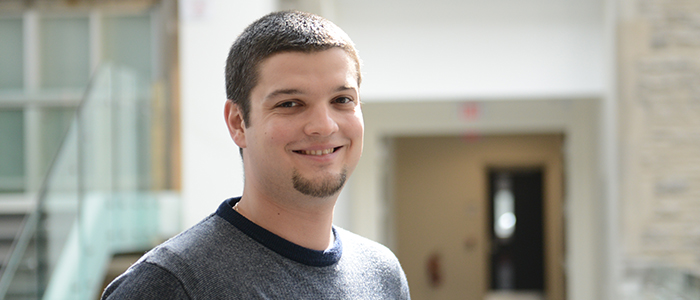Bringing lessons home
By Emily Leighton, MA'13
Watching his grandfather die made Ryan Renn, Medicine Class of 2016, feel helpless. A teenager at the time, he didn’t understand the connection to the unique health challenges facing First Nations communities.
“I had no idea what was happening or that he showed all the comorbidities that First Nations have in health – the diabetes, the heart attacks,” he said. “Now, as a medical student, I can reflect back and recognize why he went through what he did.”
These are lessons Renn will be bringing back home as a family medicine resident to make a positive difference in the health of his community.
“I’m thrilled to finally go home and practise where my dream has always been,” he said. “And I’m looking forward to giving back to a community that has supported this dream.”
Home for Renn is the town of Caledonia and the neighbouring Six Nations of the Grand River, located in Oshweken. In July, he will be starting a two-year family medicine residency through McMaster University, with an opportunity to practise on the reserve.
While Six Nations has been a constant in his life, it wasn’t always for his family. Renn’s mother belongs to the Tuscarora Nation, but grew up unaware of her family’s aboriginal status. It was a heritage only realized when her sister, Renn’s aunt, decided to pursue postsecondary education.
The revelation was surprising, and not without heartache. Renn’s maternal grandfather was a residential school survivor. “He was stripped of his culture, so it was something he didn’t talk about,” explained Renn. “And so a lot of that sense of identity was lost.”
“It’s been difficult because I feel like I don’t know enough about what was potentially stolen from my family,” he added. “It really wasn’t until recently that I started seeking out that part of my family history and culture.”
In some ways, Renn’s journey to discover his roots parallels his pursuit of higher education – and both ultimately found common ground in medicine.
The 28-year-old studied at Brock University in St. Catharines for six years, completing a bachelor of science in neurobiology and a master’s degree in behavioural neuroscience.
Renn entered Schulich Medicine in 2012, filling one of three seats the School reserves for First Nations, Metis or Inuit students in each year of the MD program.
Medical training provided an ideal environment for the eager student to explore aboriginal health and culture.
During his first and second years, he joined the Aboriginal Health Advocacy Group at the School and worked at the Southwest Ontario Aboriginal Health Access Centre (SOAHAC) in London.
He also volunteered with grade five and six students from at-risk families in the Oneida Nation of the Thames community, southwest of London – teaching the students how to read and write, helping with math and leading physical activities.
But it was a particularly impactful clinical experience on Manitoulin Island earlier this year that affirmed his dreams of returning home to practise.
Based in Little Current, Renn had the opportunity to visit reserves around the island. “I saw a lot of my home community of Caledonia reflected in the communities of Manitoulin,” he said. “Six Nations has supported me through ten years of university, so I want to give back.”
And Renn’s own story certainly serves as a way of giving back, inspiring the next generation to consider a career in medicine.
“We need to plant ideas from a young age,” he said. “Children can look to role models – hopefully someone like myself – and say ‘look, he did it, why can’t I?’”










